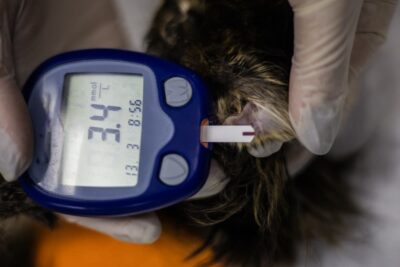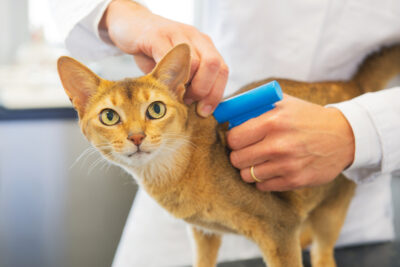Chamomile for Cats: Is It Safe?

You might already be familiar with chamomile and its naturally soothing, calming properties. You drink it at night before bed to relax. It doesn’t have caffeine like other teas. You might even have it when you’re sick to help you sleep. But did you know, you can also give chamomile to your cats?
Some chamomile-based products are marketed to calm cats down and promote relaxation.
So, should you give chamomile to your cats? Are there benefits? And by the same token, are there any potential dangers or risks? Let’s dive in.
Is Chamomile Safe for Cats?
The short answer to this question is, it depends. In small doses, chamomile is fine for cats. It’s important to know the dosage that is best for your cat, so consult your veterinarian before you give it to your feline friend.
It’s also important to note that studies about chamomile’s effect on cats are limited. That means potential side effects are not well known.
“Chamomile has not been sufficiently studied to fully characterize the risks of using it in cats,” says Dr. Jo Myers, practicing veterinarian at Vetster. “Chamomile contains compounds called flavones. One of these (called apigenin) was shown to cause sedation and inability to walk when given to mice at higher doses.”
Before you purchase any chamomile-infused products for cats, go through the label and ask your vet if any of the ingredients pose any risks for your pet. You should also carefully read the directions so you understand use, dosage, and other considerations. Some of these considerations include whether or not chamomile might interact with other medications or even vitamins your cat might be taking. When in doubt, consult with your veterinarian before giving products containing chamomile to your cat.
Types of Chamomile for Cats
Chamomile for cats comes in different forms. Some of the most common include:
- Chamomile in the form of powders that you add to food
- Chamomile in liquid forms like tea
- Chamomile in capsule form
- As an ingredient in soft chews for cats
Regardless of the type of chamomile you give your cat, it’s important to do so under the guidance of a licensed vet.
Benefits of Chamomile for Cats
If your cat is suffering from anxiety or not sleeping well, they may be a good candidate to use chamomile. Chamomile has soothing properties that may help a cat suffering from mild anxiety.
However, Dr. Meyers warns that chamomile-based product claims for cats are unproven. “These products generally do not carry out quality control studies demonstrating the amount of chamomile in each treat, so it’s impossible for any claims about calming or other effects to be accurate,” she explains.
In addition, the side effects of long term usage in cats are unknown and may cause toxicity in cats. Chamomile is best used as a short-term solution and it is imperative that cat owners follow all instructions on how much to give their cat so they don’t cause problems with toxicity.
Chamomile Dosage for Cats: What You Need to Know

How much chamomile should you give to your cat? Well, it’s not simple to answer. It depends on a number of factors, like:
- What type of chamomile product are you giving your cat
- The concentration of chamomile in the product you’re giving
- Your cat’s body weight
- If your cat is taking other medications, vitamins, or supplements
It is important to follow the instructions on the label of products that contain chamomile and not give more than is recommended. Avoid using the plant leaves, stems, or flowers in or on cats.
“Before giving chamomile or any other supplement to your cat, talk to your veterinarian first to be sure it’s a safe formulation and dosed according to your cat’s age, body weight and health status,” advises Dr. Carol Osborne, of Chagrin Falls Pet Clinic.
Regardless of dosage, once you get the green light from your vet that chamomile is okay to use and how much to give, and make sure to monitor your cat. If the chamomile causes loss of appetite, lethargy, vomiting, diarrhea, or soft stool, stop giving your cat the supplement. If your cat continues to have any issues after discontinuing chamomile, call your vet.
Side Effects of Chamomile in Cats
Parts of the chamomile plant are highly toxic, according to the ASPCA, due to their high concentration of toxic chemicals, like: chamazulene, bisabolol, volatile oil, anthemic acid, and tannic acid. If enough of these parts are ingested, it can be fatal.
If your cat ingests too much chamomile, the wrong concentration of chamomile, or a chamomile plant (like its stem, leaves, petals, roots and pollen), they may fall victim to chamomile poisoning. Dr. Osborne warns that toxicity signs include: vomiting, diarrhea, loss of appetite, with or without signs of internal and/or external bleeding. In severe cases, chamomile poisoning can be fatal.









